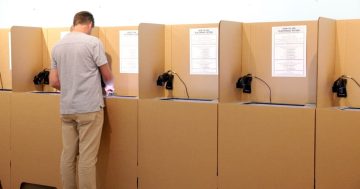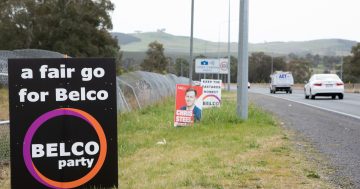
Early voting for the 2020 ACT election. Photo: Michelle Kroll.
The impact of COVID-19 on the ACT election, early voting and electronic voting will come under the scrutiny of a Legislative Assembly committee.
Last October’s poll, in which a Labor-Greens government was returned, was marked by measures to prevent the spread of COVID-19, including the encouragement to vote early to spread voting across the three-week voting period to avoid election day crowds.
Amendments to the ACT Electoral Act removed eligibility requirements for early voting, permitting all eligible electors to vote early at the 15 Early Voting Centres established across the city.
It was also an election in which most people voted electronically, which made for a fast count on election night and an early verdict on who would form government.
The committee will look at the implementation, security and transparency of electronic voting, which is not connected to the internet and involves standard personal computers as voting terminals, with voters using an e-voting card to authenticate their votes.
There was some controversy after the election when a report by cybersecurity expert and cryptographer Dr Vanessa Teague and mathematician Andrew Conway said the system was flawed and could lead to incorrect election results in the future if not corrected.
They said code used by Elections ACT incorrectly grouped votes and did not round down, although they did not believe any candidate was wrongly elected.
At the time, ACT Electoral Commissioner Damian Cantwell rejected the claims and stood by the system.
The Legislative Assembly committee will also examine the timeframe and accessibility of early voting, and the number and location of polling places, as well as the length of the six-week election campaign period.
Political donations will also be put under the microscope to see if there are ways to improve the current donation rules and timeframes for reporting donations.
New rules legislated before the ACT election will come into effect in the middle of 2021, including the banning of donations from property developers, and any gifts above the value of $1000 needing to be disclosed to the ACT Electoral Commission within seven days.
The committee will also look at restrictions on campaigning activities outside polling places, on roadside signs, and address the corflute question that dogs every election campaign.
Increasing voter turnout and participation in elections, and encouraging political activity is also on the agenda, as well as lowering the voting age, which the ACT Greens have supported, saying voting should be optional for 16-year-olds and 17-year-olds.
The chair of the Standing Committee on Justice and Community Safety, Liberal Jeremy Hanson, said the recent election was conducted during the extraordinary circumstances of the COVID-19 pandemic.
“The committee looks forward to hearing from as many people as possible about their experiences of the 2020 election, and any ideas for improvement,” he said.
For more information or to make a submission, head to the ACT Legislative Assembly website.



















